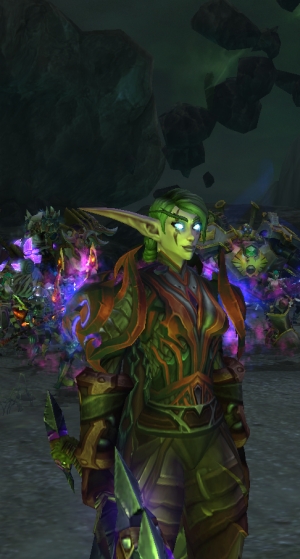
Today is the official release of Mass Effect: Andromeda, which was preceded by the frankly baffling decision to allow people access to an early build of the game ahead of time. Or perhaps the final build without everything enabled? The point is that you could play a bit of it if you were willing to drop some money. That seems like a bad idea that we’ve been dealing with in online-game-land for a long time, but regardless, it gave people the opportunity to see some of this RPG ahead of time.
This, in turn, allowed the typical internet trolls to find any and all animation flubs and then happily declare that it was all the result of one woman working on the game and handling all of the animations. Which, you know, is a conclusion that would be helped significantly if the woman in question actually worked in that role on the game, which she did not.
Obviously, the game under discussion is not an MMO. But it is symptomatic of two all-too-common problems in gaming culture that are worth noting to people who do not have balls of spiders in place of a soul. So let’s talk about those.
Games are big
 Do me a favor and go watch the credits for Final Fantasy XIV. (If you don’t already own a copy of FFXIV, you have made a poor choice and you’ll have to just take my word on everything here.) This is a game with a big budget and large production values, and its credits are… substantial. And in what should be not a surprise at all, the name “Naoki Yoshida” crops up exactly twice in those credits as the game’s producer and director.
Do me a favor and go watch the credits for Final Fantasy XIV. (If you don’t already own a copy of FFXIV, you have made a poor choice and you’ll have to just take my word on everything here.) This is a game with a big budget and large production values, and its credits are… substantial. And in what should be not a surprise at all, the name “Naoki Yoshida” crops up exactly twice in those credits as the game’s producer and director.
That means, at the end of the day, that those were his areas of focus. That was his job. That was what he did. He oversaw the production of the game, directed what people were doing, but he did not, in fact, have personal oversight of every aspect of the game’s design.
Does that mean that he signed off on everything in the game? Yes. But it also means that the sheer nature of how much stuff is in the game meant he couldn’t carefully check every single part line-by-line. Even if he could check and see certain issues, he may or may not have been able to address those issues before the game launched. He was not the only person involved in the making of this game.
In fact, there are very few MMOs for which you can point to a single person as the sole proprietor of a game. Pretty much everything else is the work of a lot of people working in concert, and while people at the top of the pile have a pretty big influence on what happens on down the line, it’s not absolute.
Let’s take a half-step back and look at a situation in the opposite direction: Mark Kern and Firefall. By most first-hand accounts, Kern’s leadership was an impediment to the game’s development and well-being. However, the game itself still stumbled out to reasonably warm perception in the MMO community. The big problem wasn’t that Kern personally killed the game, just that he burned through a huge amount of money that greatly diminished what Red 5 Studios could do from there on out. He made the game a lot worse than it could have been, but it would be downright wrong to say that everything wrong with the game was his fault personally.
This goes even more strenuously for people further on down the line. The animator who worked on a game is likely not the person making top-level decisions or even the person making mid-level decisions. That animator’s work was checked by several people and was subject to several other parts of the game working correctly, like the game calling for the right animations at the right times and the models all corresponding properly. The best animations in the world don’t matter if the game isn’t indexing assets correctly and everything displays like a mess.
So there’s the first part: Games are big. You cannot, in most cases, point to one person and say that it’s Jerry’s fault; it’s usually the result of a lot of factors coming together. Even on indie titles, you’re looking at more than one person making things happen.
Don’t choose the targets you want
 Of course, as mentioned above, all of this would be much better if the woman being attacked had actually worked on the animations at all. This was not the case. She was targeted because she had worked in roughly the right field at around the right times and she was, well, a woman. That was all the legions of grousing Twitter denizens really needed to launch a harassment campaign: They already wanted to dislike her. She was a woman working with video games. Any actual evidence was secondary.
Of course, as mentioned above, all of this would be much better if the woman being attacked had actually worked on the animations at all. This was not the case. She was targeted because she had worked in roughly the right field at around the right times and she was, well, a woman. That was all the legions of grousing Twitter denizens really needed to launch a harassment campaign: They already wanted to dislike her. She was a woman working with video games. Any actual evidence was secondary.
Not to put too fine a point on it, this is beyond awful. And it’s another thing we have a nasty tendency of doing: We pick the targets we want to be responsible for something and assume they must be at fault.
This is something we’re all unhappily good at. It’s tempting and easy, for example, to say that the reason why X game didn’t take off is because a whole bunch of World of Warcraft players just jumped into the game and then jumped back out, neglecting questions like “why didn’t the developers plan for exactly that” and “why is it that all of the complaints from people who started playing and then stopped are centered around the game being too much like WoW.” It’s easy because these are the culprits you want, and that means it’s more satisfying to blame them.
Alas, life rarely works that way. What happens more often is that you see certain patterns repeat with certain common elements, and that points to those common elements as a shared contributing factor. You can even see it when people accuse this site of hating, say, subscription games or sandboxes or raiding or whatever.
Leaving aside the fact that this site is not a monolithic establishment and we frequently disagree (Bree and I argue for hours sometimes in good-natured debates), the simple reality is that we don’t hate any of these things. I don’t hate subscription games; I’m playing three of them right now, and historically I subscribe to any game that gives me that option when I’m playing. But I also recognize that a subscription game in the current market is facing constant competition from an army of free-to-play games, and it’s far more likely that the subscription model is going to turn people off than that it will convert new people.
That’s basic logic. Don’t decide on what you think is true and then find situations that support it; find what evidence there is and then draw a logical conclusion from that. And be reluctant to accept reasoning that coincidentally lines up exactly with what you want to be true.
Neither of these things is new, of course. Neither of them is even particularly unusual. But as we look at the latest person being harassed about a game unfairly to punish a perceived slight that isn’t any one person’s fault to begin with? It’s worth considering.
 Everyone has opinions, and The Soapbox is how we indulge ours. Join the Massively OP writers as we take turns atop our very own soapbox to deliver unfettered editorials a bit outside our normal purviews (and not necessarily shared across the staff). Think we’re spot on — or out of our minds? Let us know in the comments!
Everyone has opinions, and The Soapbox is how we indulge ours. Join the Massively OP writers as we take turns atop our very own soapbox to deliver unfettered editorials a bit outside our normal purviews (and not necessarily shared across the staff). Think we’re spot on — or out of our minds? Let us know in the comments!














